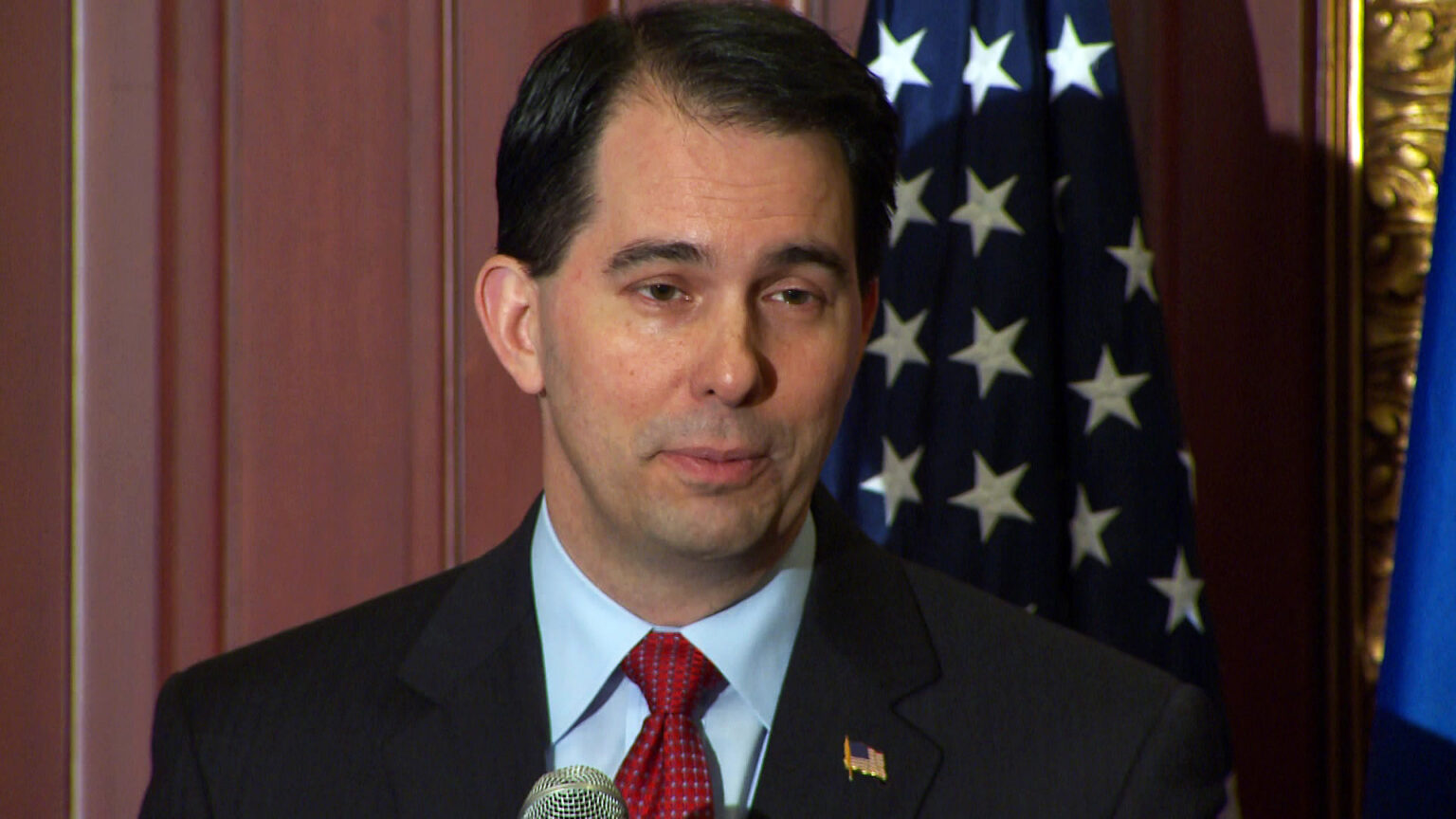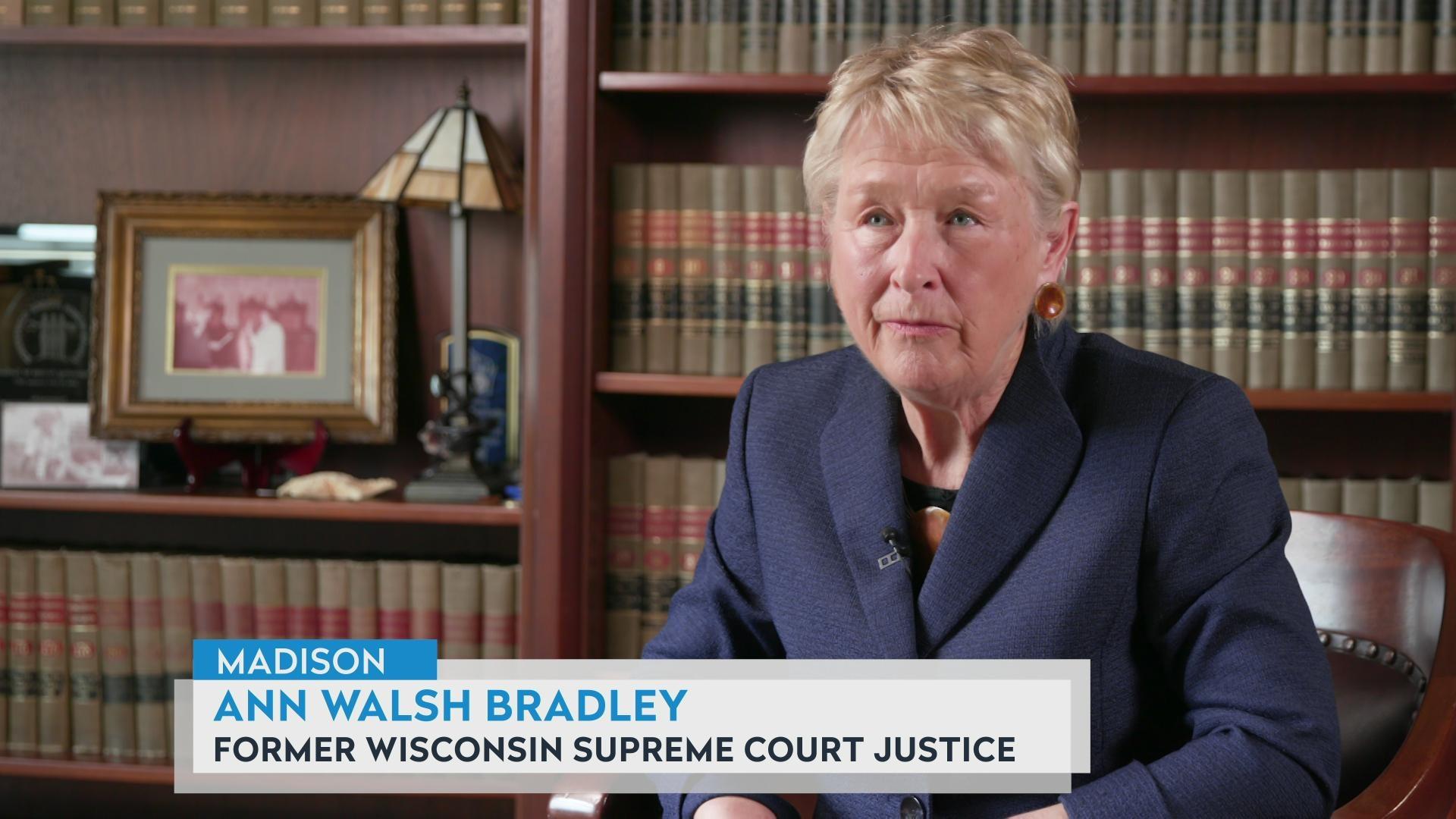Unions sue to reverse Act 10 restrictions on teachers, other public workers in Wisconsin
Act 10 exempts police and other public safety workers from collective bargaining limitations placed on other public employees — a lawsuit filed by seven unions argues this distinction violates the Wisconsin Constitution's equal protection guarantee.
Associated Press
November 30, 2023

Then-Gov. Scott Walker, a Republican, gives a press conference on March 14, 2023, at the Wisconsin State Capitol in Madison. Seven unions representing teachers and other public workers in Wisconsin filed a lawsuit on Nov. 30, 2023, seeking to overturn Act 10, the state's near-total ban on collective bargaining for most public employees, which was a signature legislative policy under the Walker administration. (Credit: PBS Wisconsin)

MADISON, Wis. (AP) — Seven unions representing teachers and other public workers in Wisconsin filed a lawsuit on Nov. 30 attempting to end the state’s near-total ban on collective bargaining for most public employees.
The 2011 law, known as Act 10, has withstood numerous legal challenges over the past dozen years and was the signature legislative achievement of former Republican Gov. Scott Walker, who used it to mount a presidential run.
The latest lawsuit is the first since the Wisconsin Supreme Court flipped to liberal control in August. But it was filed in a county circuit court — unlike other major cases that have gone directly to the Supreme Court since its ideological shift — and will likely take more than a year to make its way up for a final ruling.
The Act 10 law effectively ended collective bargaining for most public unions by allowing them to bargain solely over base wage increases no greater than inflation. It also disallowed the automatic withdrawal of union dues, required annual recertification votes for unions, and forced public workers to pay more for health insurance and retirement benefits.
The law’s introduction in 2011 spurred massive protests that stretched on for weeks. It made Wisconsin the center of a national fight over union rights; catapulted Walker onto the national stage; sparked an unsuccessful recall campaign, and laid the groundwork for his failed 2016 presidential bid. The law’s adoption led to a dramatic decrease in union membership across the state.
The lawsuit filed by teachers and other public workers on Nov. 30 alleges that Act 10’s exemption of some police, firefighters and other public safety workers from the bargaining restrictions violates the Wisconsin Constitution’s equal protection guarantee. The complaint notes that those exempted from the restrictions endorsed Walker in the 2010 gubernatorial election, while those subject to the restrictions did not.
A similar argument was made in a federal lawsuit alleging that Act 10 violated the equal protection guarantee in the U.S. Constitution. But a federal appeals court in 2013 said the state was free to draw a line between public safety and other unions, and the following year again ruled that the law was constitutional.
The Wisconsin Supreme Court in 2014 also upheld the law as constitutional, rejecting a lawsuit brought by teachers and Milwaukee public workers. That case raised different arguments than the current lawsuit. And in 2019, a federal judge rejected a lawsuit brought by two arms of the International Union of Operating Engineers that argued the law violates free speech and free association under the First Amendment.
The Wisconsin courts should follow the lead of the Missouri Supreme Court, which struck down a law resembling Act 10 in 2021 based on similar arguments, union attorney Jacob Karabell said in a written statement.

Up to 100,000 protestors assembled in downtown Madison outside the Wisconsin State Capitol on March 12, 2011, to demonstrate against Act 10, a law that effectively ended collective bargaining for most public unions in the state. (Credit: PBS Wisconsin)
If the case reaches the Wisconsin Supreme Court, it’s unclear who would actually hear it.
Justice Janet Protasiewicz, whose win this year tilted majority control of the court 4-3 in favor of liberals, said during the campaign that she believes Act 10 is unconstitutional. She also told the Milwaukee Journal Sentinel that she would consider recusing herself from any case challenging the law. Protasiewicz participated in protests against the law and signed the petition to recall Walker.
Conservative Justice Brian Hagedorn was Walker’s chief legal counsel and had a role in drafting the Act 10 law. But during his successful run for the court in 2015, Hagedorn would not promise to recuse himself if a case challenging Act 10 came before the court.
If the latest lawsuit in Wisconsin is successful, all public sector workers who lost their collective bargaining power would have it restored. They would be treated the same as the police, firefighter and other public safety unions who remain exempt.
“The end of Act 10 would mean that we would have a real say again in our retirement plans, health care and time off — without the threat of loss of our union every year,” Wayne Rasmussen, who works for the Racine Unified School District, said in a statement. Rasmussen is one of three individuals named in the lawsuit along with the unions. He is vice president of the Service Employees International Union of Wisconsin, which represents health care workers and others.
Walker, in a statement to The Associated Press, accused “union bosses” of attempting to regain power.
“Multiple federal and state courts have upheld Act 10,” he said. “It is constitutional and it is working.”
Republican Assembly Speaker Robin Vos said repealing the law, which allowed schools and local governments to raise money through higher employee contributions for benefits, would bankrupt those entities.
“This is another attempt by liberal special interest groups to undo the law to please their donors now that there’s been a shift in the court,” Vos said.
Democratic Gov. Tony Evers’ administration was named as a defendant in the lawsuit since it is charged with implementing the law. But Evers opposed Act 10 at the time, when he was the state education secretary, and he also signed the Walker recall petition.
Spokespersons for Evers and for the state Department of Justice, which is charged with defending the state in the lawsuit, did not return email and text messages seeking comment.
 Passport
Passport











Follow Us